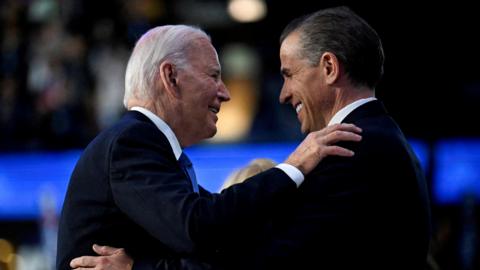Trump was referring to his supporters who stormed the US Capitol on 6 January 2021 in a bid to overturn Trump's defeat in the 2020 election.
Joe Biden's full and unconditional pardon for his son comes after the president had previously said he would not give him clemency.
Just a couple of months ago, in September, the White House press secretary said that Biden would not issue a pardon for his son.
But on Sunday evening, President Biden said although he believed in the justice system, "politics has infected this process and it led to a miscarriage of justice".
"From the day I took office, I said I would not interfere with the Justice Department’s decision-making, and I kept my word even as I have watched my son being selectively, and unfairly, prosecuted," he said.
Biden said he wrestled with the decision, and added: "once I made this decision this weekend, there was no sense in delaying it further."
"I hope Americans will understand why a father and a President would come to this decision," he said.
In a reaction statement, Hunter Biden said mistakes he made during the darkest days of his addiction had been "exploited to publicly humiliate and shame" his family for political sport.
"I will never take the clemency I have been given today for granted and will devote the life I have rebuilt to helping those who are still sick and suffering," the 54-year-old added.
The younger Biden has been sober for five-and-a-half years, his father said.
This is not the first time a US president has pardoned a member of their family.
Bill Clinton pardoned his younger half-brother, Roger Clinton, for a 1985 cocaine-related offence in 2001.
In 2020, Donald Trump pardoned Charles Kushner, the father-in-law of his daughter Ivanka. President-elect Trump has recently announced that Kushner will be the new ambassador to France.
